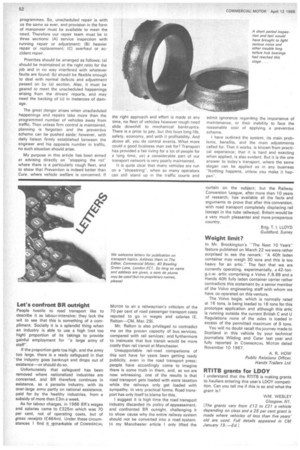Let's confront BR outright
Page 54

If you've noticed an error in this article please click here to report it so we can fix it.
People hostile to road transport like to describe it as labour-intensive; they lack the wit to see that this is something of a compliment. Socially it is a splendid thing when an industry is able to use a high (not too high) proportion of its takings to provide gainful employment for "a large army of staff".
If the proportion gets too high, and the army too large, there is a ready safeguard in that the industry goes bankrupt and drops out of existence—or should do so.
Unfortunately that safeguard has been removed where nationalized industries are concerned, and BR therefore continues in existence, as a parasite industry, with its over-large army partly on national assistance, paid for by the healthy industries, from a subsidy of more than E3m a week.
As for labour charges, in 1966 BR's wages and salaries came to E325m which was 70 per cent, not of operating costs, but of gross receipts (E464m). Under these circumstances I find it remarkable of COMMERCIAL
Mimi to air a railwayman's criticism of the 70 per cent of road passengertransport costs reputed to go in wages and salaries (E. Reiton—CM, Mar. 29).
Mr. Relton is also privileged to contradict me on the proven capacity of bus services, compared with rail services; and furthermore to insinuate that bus transit would be more costly than rail transit at Manchester.
Unsupportable rail-road comparisons of this sort have for years been getting ready publicity, even in the road transport press: people have accordingly come to imagine there is some truth in them, and, as we are now witnessing, one of the results is that road transport gets loaded with extra taxation while the railways only get loaded with sympathy, in very practical forms. Road transport has only itself to blame for this.
I suggest it is high time the road transport industry discarded its policy of appeasement, and confronted BR outright, challenging it to show cause why the entire railway system should not be converted into a road system. In my Manchester article I only lifted the curtain on the subject; but the Railway Conversion League, after more than 10 years of research, has available all the facts and arguments to prove that after this conversion, with road transport completely displacing rail (except in the tube railways), Britain would be a very much pleasanter and more prosperous country.
Brig. T. I. LLOYD Guildford, Surrey




































































































